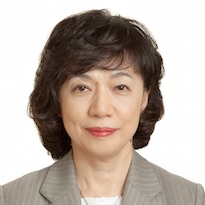GS6 Speakers
Mikiko Ishikawa

Professor of Environmental Design, Department of Integrated Science and Engineering for Sustainable Society, Chuo University, Japan.
Experiences from the reconstruction planning after Great East Japan Earthquake (download presentation here ![]() )
)
Plenary Panel 4: Building Public Aspirations for Socioeconomic Improvement through Gender-Based Technologies
Mikiko Ishikawa has been a Professor of Environmental Design, in the Department of Integrated Science and Engineering for Sustainable Society, Chuo University, Japan, since 2013. Her areas of specialization are urban environmental planning and landscape planning and environmental design. She completed her Master’s of Landscape Architecture at the Harvard Graduate School of Design and a doctorate in Landscape Architecture (Agrobiology) at the Graduate School of Agricultural and Life Sciences, University of Tokyo. She is certified as a Landscape Architect and City Planner by the Ministry of Science and Technology in Japan.
After serving as special full-time professor in the Faculty of Architecture, Kogakuin University, professor on the Faculty of Environment and Information Studies, Keio University, and professor at the Department of Urban Engineering, Graduate School of Engineering, University of Tokyo. She is a member of the Science Council of Japan and serves as the chairwoman of the Iwanuma Disaster Recovery Council, as well as a member of the Miyagi Prefecture Disaster Recovery Council. She won First Prize at the European Union International Fund’s International 21st Century Park Design Competition in 2003, as well as the Sichuan Earthquake Reconstruction Grand Design Honor Award in 2008. Her major publications include “Cities and Green Space” (Iwanami Shoten), “The Age of Watershed Planning” (Gihodo), and “Thinking About 21st Century Cities” (University of Tokyo Press). She has been involved in more than 20 major Landscape Design and Planning projects and has published more than 15 major books and/or related papers.
Summary of talk for Gender Summit 6 Asia-Pacific:
Gender in Town Planning is one of the basic issues for achieving public aspirations for improving socioeconomic conditions by providing a safe environment, welfare, and income. In this presentation, the author will talk about her four and half years’ experience on community-based reconstruction following the Great East Japan Earthquake Disaster which occurred in March, 2011. The target town is Iwanuma City in Miyagi-pref., Japan. Community-based reconstruction means the process of social, environmental, and cultural reconstruction for the community, carried out by disaster victims with the support of the municipality and others. The author analysed this process from April 2011 to July 2015, and clarified the characteristics and evaluated them through the lens of gendered innovation. As a result, this research has clarified the necessity of four stages. The first stage is the establishment of grand design; the second is citizen workshops; the third is the formulation process carried out by the municipality, and the fourth is the creation of a new Machizukuri (town planning) association by victims. In each stage, gendered innovation was introduced to play diverse roles. When the community faced to the huge crisis, the most important things were to set up the proper goals, to figure out means of implementation, and to create a system of consensus building. In this presentation, the author will analyse gendered innovations from the perspective of the above three points, and consider the perspectives of town planning in Asian countries.
